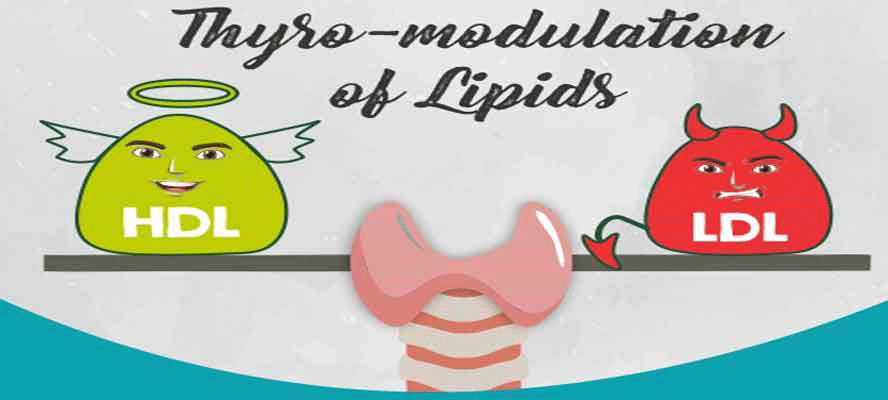Thyro-modulation Of Lipids - A Link Between Thyroid And Lipids
Posted By HealthcareOnTime
Posted on 2022-01-12
Thyro-modulation of Lipids
Series of bold numbers, along with the respective test, made him wonder, "Whats wrong with
my health state, When doctor named the culprit, he was gravely puzzled How can thyroid leave
his whole LDL-bad cholesterol shuffled?
thyroid hormones are well known for playing a key role in regulation of Metabolic as
well as mobilization of lipids. Changes in the compositions and transport of lipoproteins
(lipid transporting molecules) are observed on alteration in the levels of thyroid hormones.
Hence, thyroid disorders can severely affect the serum lipid profile leading to predisposition
of atherosclerotic and coronary artery diseases.
Thyroid Hormones: the body regulators
Small yet dominant, the butterfly shaped thyroid gland is located in the base of our neck.
Thyroid Stimulating Hormone (TSH) acts as a thyroknob thereby stimulating the formation
of T3 (triiodothyronine) and T4 (thyroxine) which are the key players of this gland and are
called thyroid hormones. lodine is the critical factor used by thyroid gland
in synthesis of T3 and 14 hormones. High TSH results in lower than normal thyroid hormone
production and the condition is called 'Hypothyroidism'; while 'Hyperthyroidism' is an outcome
of low TSH and higher than normal values of thyroid hormones. Thyroid hormones affect every
cell and organ of our body, regulating body temperature, metabolism, and heart rate.
How is Thyroid and Lipid Linked?
Thyroid hormones modulate lipid metabolism in several ways. Thyroid hormones enhance
hepatic lipogenesis which is the conversion of molecules participating in biochemical reactions
to fatty acids. Thyroid hormones regulate the enzymes responsible for the activity of LDL-bad cholesterol
transport. They also stimulate the liver enzymes which breaks down HDL to LDL-bad cholesterol and activates
enzymes which helps in breakdown of triglyceride-rich lipoproteins. Thyroid hormones are
also known to induce the enzyme HMG-COA reductase which is involved in the first step of
cholesterol biosynthesis. Thyroid hormone is also said to increase the reverse cholesterol
transport which involves transferring of cholesterol from all cells to liver for their breakdown
and subsequent elimination from body in the form of feces..
Hyperlipidemia and Hypothyroidism
Hypothyroidism is a major cause of secondary dyslipidemia (abnormal concentrations of
cholesterol or lipids in blood). Hyperlipidemia is the condition marked with the presence
of high levels of bad fats and cholesterol in the body. Increase in the TSH levels, which is
characteristic of hypothyroidism, is correlated to the elevated concentrations of total serum
cholesterol, LDL, nonHDL cholesterol and TG (triglycerides); while lowering the HDL also
known as good cholesterol. Increase in cholesterol and LDL levels also contribute to the
decrease in LDL clearance by means of reduced LDL binding receptors, present in liver and
other tissues. Thyroid hypofunction also accounts for hypertriglyceridemia (high levels of
triglycerides) by reducing the removal of triglycerides.
Hypolipidemia and Hyperthyroidism
Hypolipidemia is the condition characterized by abnormally low levels of lipids in blood.
It is less common than hyperlipidemia, but it affects the normal lipid lipid of the body.
Hyperthyroidism is related to unexpected lowering of lipids which leads to sudden
improvements in lipid profile or less than normal lipids in few cases. Hyperthyroidism
also enhances cholesterol removal and LDL replacement resulting in lowering of total
and LDL cholesterol, while the HDL level decreases or remains unchanged.
Signs and Symptoms
Hypothyroidism
fatigue, lethargy, cold intolerance, slowed reflexes, hair loss, dry skin, weight gain, constipation
Hyperthyroidism
nervousness, anxiety, heart palpitations, rapid pulse muscle weakness, weight loss with
increased appetite, heat intolerance, frequent bowel movements
Dyslipidemia
abnormal concentrations of cholesterol or lipid can either mean an elevation or depletion
in lipid levels. Hypolipidemia is usually asymptomatic and it can be detected on routine
health check up.
Some common symptoms for Hyperlipidemia include
breathlessness during short walks, dizziness, chest pain, fatigue (tiredness)
Diagnosis
>> thyroid profile
It is stated that the prevalence of thyroid dysfunction is approximately 5-10% during a
life time, this signifies the importance of estimation of thyroid hormone levels.' Testing
for thyroid involves biochemical screening of thyroid hormones which involves the
estimation of TSH, T3 and T4 values which can be useful in keeping a check on our thyroid
levels. Fluctuation in these levels can lead to hypothyroidism or hyperthyroidism,
Graves' disease or even thyroid PET-CT Scan.
>> Lipid profile
Since some conditions are asymptomatic, routine check up becomes the utmost priority
for proper body functioning. Testing for Lipid profile includes estimation of different
parameters such as HDL cholesterol, LDL cholesterol, total cholesterol, triglycerides,
and also the ratios of LDL/HDL as well as TC/HDL. Abnormal values of these parameters
can be indicative of the heart diseases and routine diagnosis can lead to early assessment
followed by timely treatment.





















































